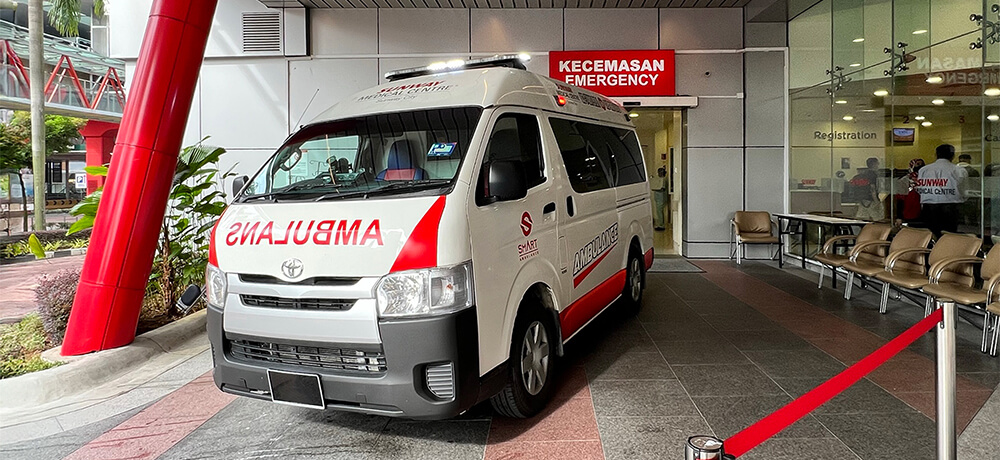What to Do in an Emergency
07 November 2025

An emergency is a serious, unexpected, and often dangerous situation that requires immediate attention. It can happen anytime and anywhere, often when we least expect it. Certain cases can be managed and treated with first aid. However, some demand professional care as there may be risks of permanent damage to the body. It is important to remain calm, think and act quickly when faced with this situation.
So, when you’re in an emergency, how will you respond?
Common Types of Emergencies
Emergencies can be quite unpredictable, but certain types of medical emergencies occur more often, especially at home or workplaces:
- Allergic Reaction
- Asthma Attack
- Heart Attack
- Stroke
- Burns
- Poisoning
- Deep Cuts and Puncture Wounds
- Choking
What to Do in an Emergency
Emergencies happen fast, often leaving us very little time to think. While it is natural to feel uncertain, knowing what to do can change lives. Here are three important things that you can do when faced with an emergency:
1. Stay Calm
It is normal to feel panicked in a crisis, but staying calm helps you think clearly and act effectively. There are three steps you can do:
- Assess the person’s situation and check the affected body part. Provide support until medical response arrives.
- Follow the emergency procedures and provide support until help arrives.
- If you are also involved in the emergency, ensure your own safety first.
2. Perform First Aid
First aid is the immediate care you provide to someone suffering from an illness or injury before professional help is available. Having basic first aid knowledge can also prevent further complications and may even save lives. A study done in 2019 in Malaysia reported that up to 2,500 choking deaths and 29,000 heart attack deaths could be prevented if more people were trained to recognise emergencies and give first aid.
Here are some first aid examples:
- Cleaning and bandaging wounds
- Performing Cardiopulmonary Resuscitation (CPR)
- Applying the Heimlich manoeuvre for choking
3. Call the Hospital’s Accident & Emergency (A&E) Department
Perhaps you have performed first aid on the patient. But if the situation worsens and the area is not conducive for any assessment, call your nearest hospital’s Accident and Emergency Department (A&E) immediately. Most major hospitals in Malaysia offer 24-hour emergency and ambulance services for critical cases.
How to Prepare for a Medical Emergency
Preparing for an emergency is crucial, especially when we can’t predict when it will happen. Taking preventive measures ensures you and your loved ones can respond quickly and effectively.
1. Identify Potential Risks
Check for any potential hazards around your home or workplace. These include loose wirings, leaked pipes or slippery floors. If someone has a medical condition, ensure their medication and supplies are stored in an accessible location.
2. Recognise Common Emergency Symptoms
Learning how to identify common emergency signs can help you act before the situation escalates. The common emergency signs are:
| Emergency | Key Symptoms |
|---|---|
| Allergic Reaction | Weak or rapid pulse, swelling, severe rash or skin reaction |
| Asthma Attack | Shortness of breath, wheezing, chest tightness |
| Heart Attack | Chest pain, cold sweat, light-headedness |
| Stroke | Drooping face, slurred speech, limb weakness |
| Burns | Peeling skin, severe pain, blisters |
| Poisoning | Nausea, muscle twitching, fainting |
| Deep Cuts | Continuous bleeding, throbbing, visible tissue or bone |
| Choking | Coughing, wheezing, holding the throat |
3. Prepare a First Aid Kit
Always keep a first aid kit in a visible, easily accessible location at house and at work. Check it regularly to ensure all the medical supplies are stocked and not expired.
4. Learn Basic First Aid Skills
Learning first aid and how to administer it is important for emergency preparedness. You may enrol in a certified first aid training course. Sunway Medical Centre conducts first aid and CPR workshops for all ages from time to time, empowering communities to respond effectively during emergencies.
5. Keep Emergency Numbers Handy
Store emergency contacts such as your next of kin and the hospital’s A&E hotline and ambulance numbers. Save them in your phone, putting it on your fridge or anywhere accessible. Also, teach your child how and who to call during emergencies.
Conclusion
If you find yourself in an emergency, try not to panic. By staying calm, performing first aid, and contacting emergency services promptly, you can help save a life.
At Sunway Medical Centre, we are Malaysia’s largest private Accident & Emergency Department. We provide 24-hour emergency clinic and ambulance services, led by a large team of skilled on-call specialists that manage various critical conditions, including:
- Pain in the abdomen, gastrointestinal bleeding
- Medical emergencies such as heart attack, asthma, stroke, choking and others
- Sprained, twisted or injured limbs, strained muscles
- Sports-related injuries
- Emergencies involving children
- ENT (Ear, Nose, Throat) and eye-related emergencies
- Other emergencies
Every second counts, every patient matters. From immediate response to expert treatment, we are always ready to provide the care you need.
EMERGENCY (24 hours): +603-5566 8888
AMBULANCE: +6019-666 6940
Click here to learn more about our Accident & Emergency services.






